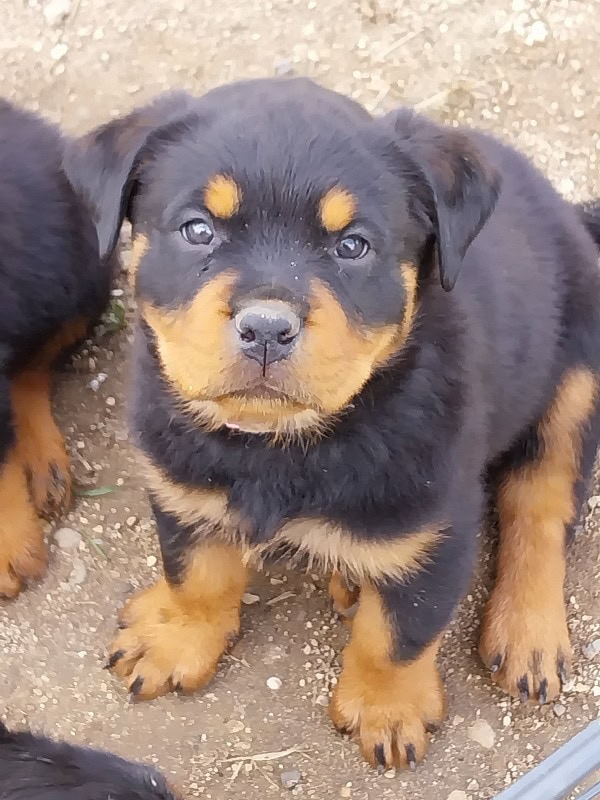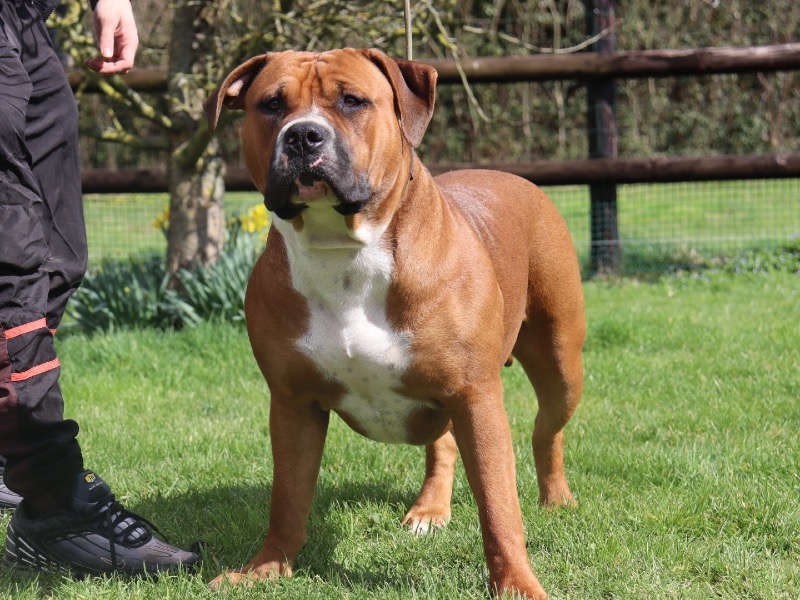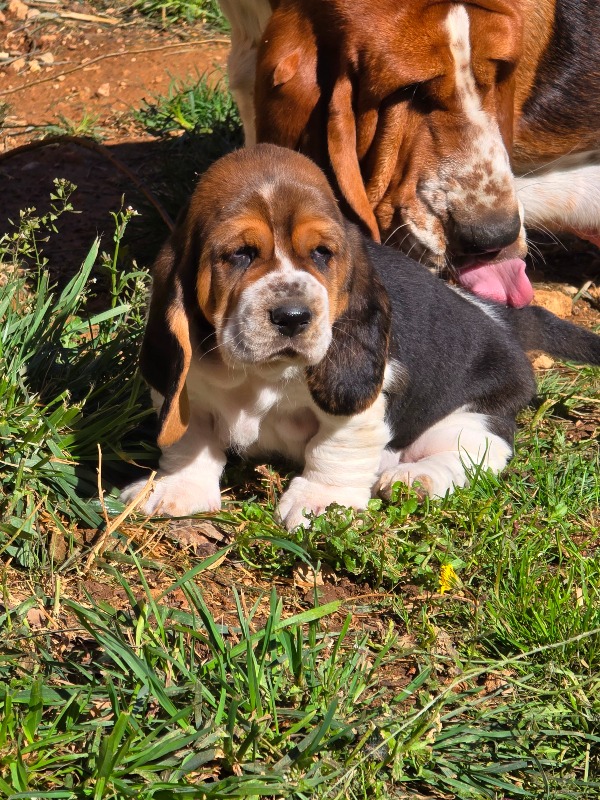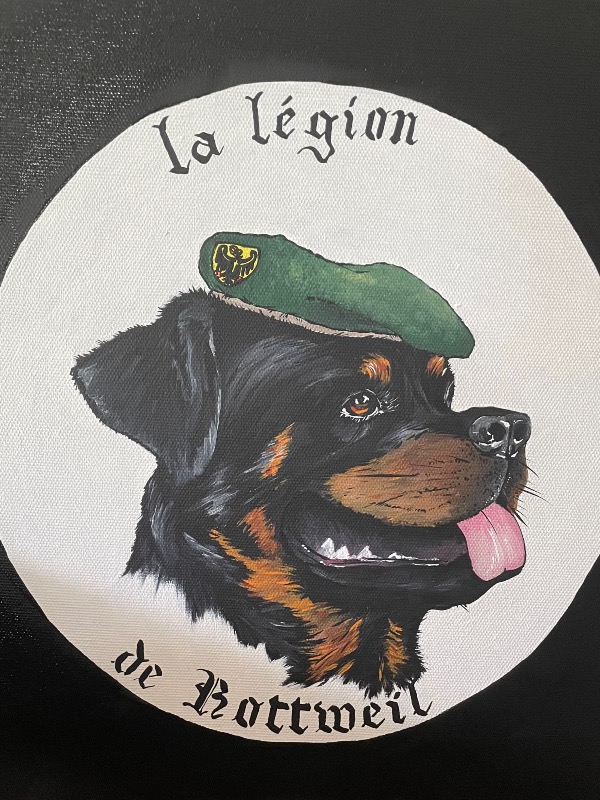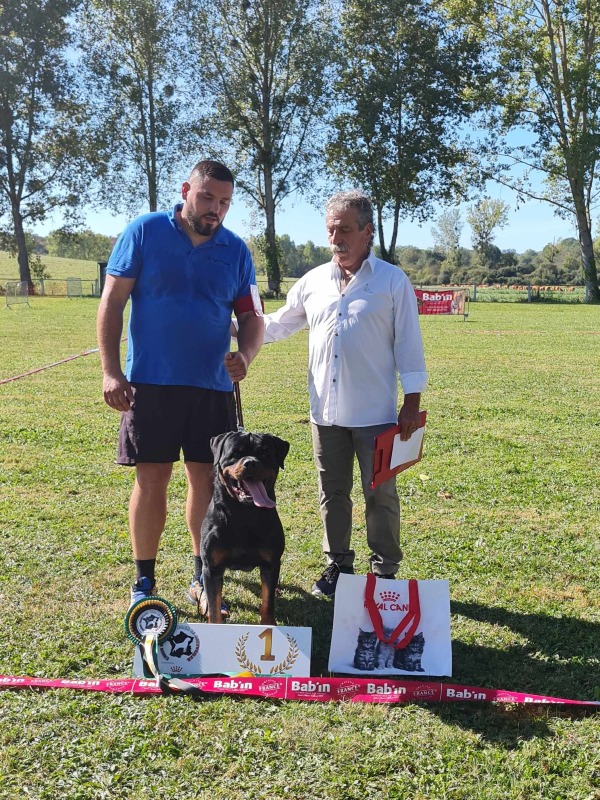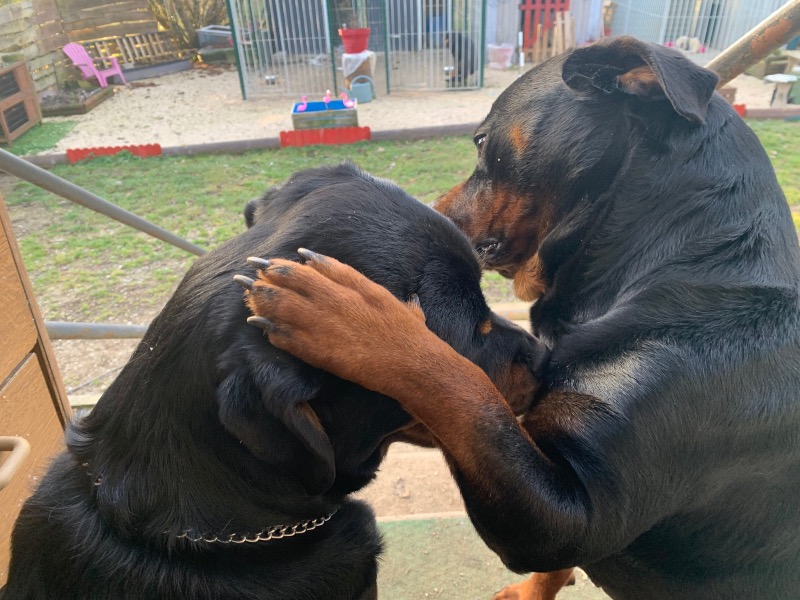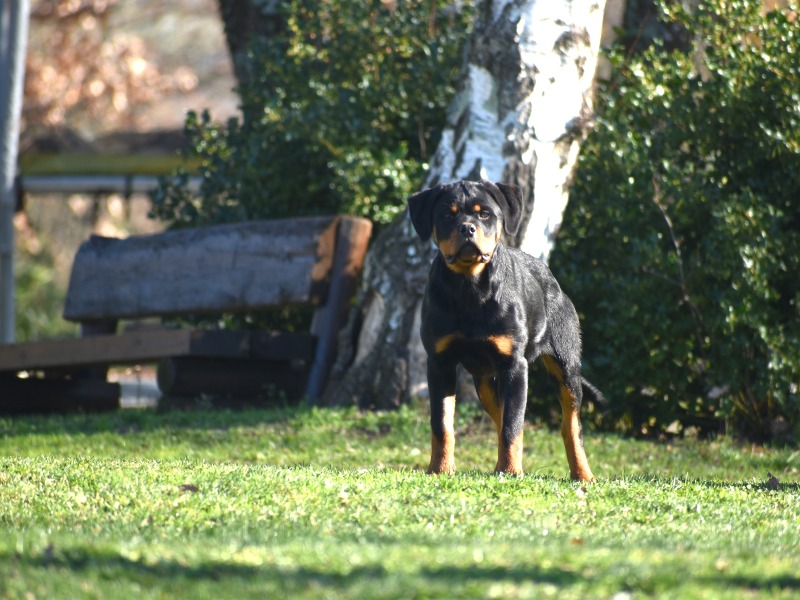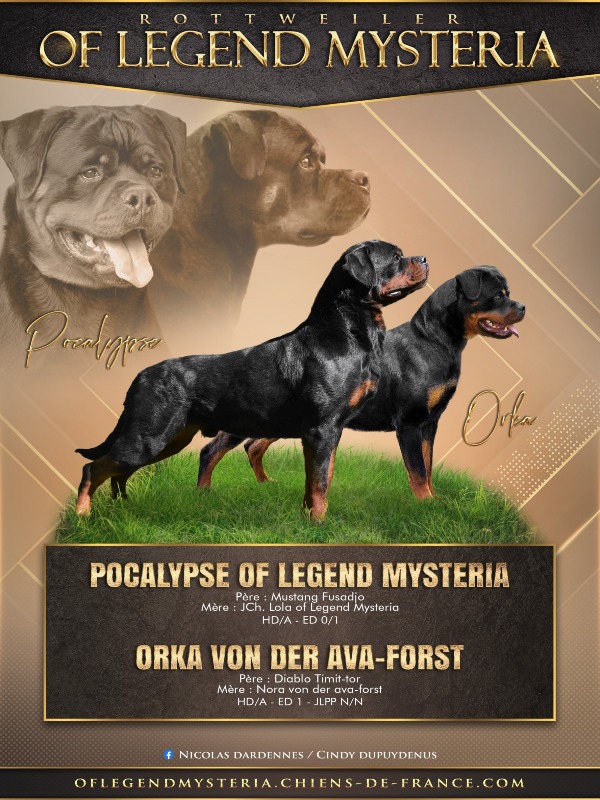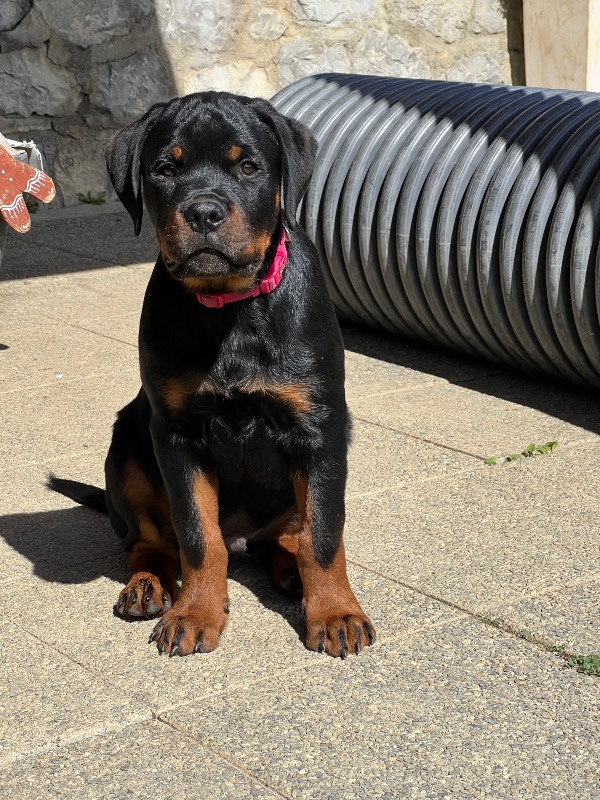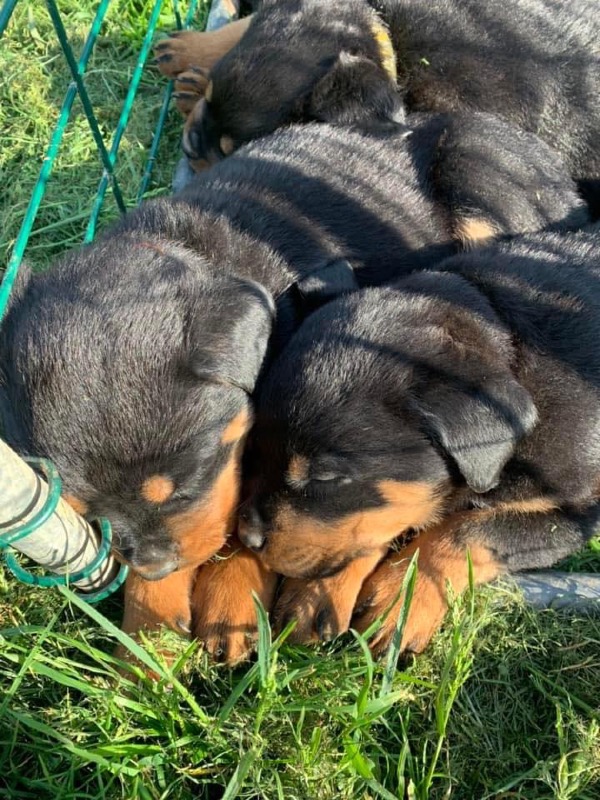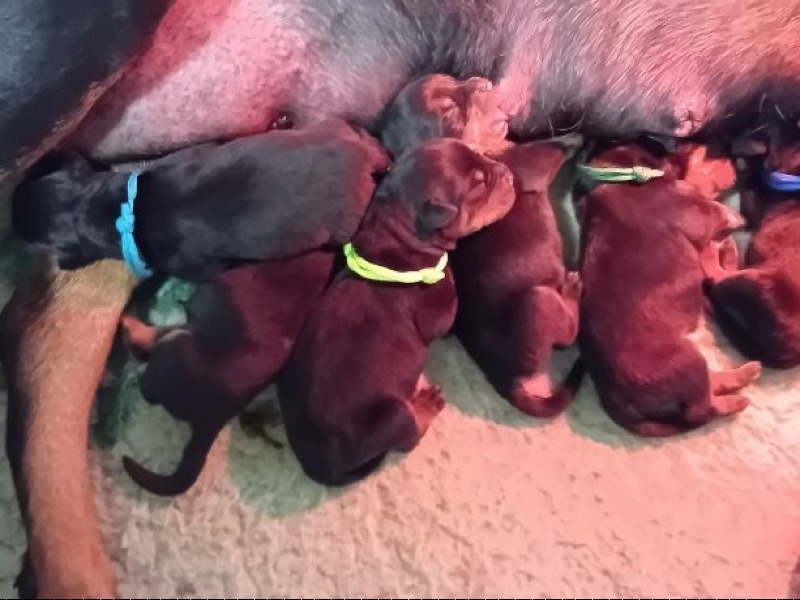Rottweiler
Autres noms : Rott, German cattle dog, Rottweil butcher dog
"Discover the Rottweiler, a powerful and affectionate dog known for its loyalty and intelligence. Ideal as a family companion and guardian, it combines strength and tenderness."
Awareness of acquiring an animal
Adopting or breeding a dog is a responsibility that must be carefully considered. Dogs are loyal companions that require time, attention, and constant care. Whether for leisure, passion, or professional breeding, it is crucial to understand the specific needs of each breed. Provide them with a loving and stimulating environment, and avoid any impulsive acquisition that could harm their well-being. Be a vigilant and committed owner for a happy and healthy companion.
To learn more about animal welfare, we invite you to consult our FAQ by clicking the button below:
Origins and history
The Rottweiler is a dog breed whose origins date back to ancient times. Its ancestors were working dogs used by the Romans to drive cattle during their campaigns. Over the centuries, these dogs adapted to human needs, particularly in the town of Rottweil, Germany, where they were employed as draft dogs and for guarding farms.
During the Middle Ages, Rottweilers became essential in trade, transporting goods and monitoring local markets. Their strength and agility allowed them to fulfill various roles, making them highly respected animals. The popularity of the breed declined with the advent of cars, but it was revitalized in the early 20th century through the efforts of breeders who emphasized physical and behavioral qualities.
Today, the Rottweiler is recognized for its loyalty, intelligence, and skills in various fields, such as security and police work. The dog has established itself as a loyal companion and a family member in many households around the world.
Physical characteristics
The Rottweiler is a robust and muscular dog breed, characterized by its imposing stature and powerful appearance. Males typically measure between 61 and 68 centimeters at the withers, while females range from 56 to 63 centimeters. Weights vary between 40 and 60 kg for males and between 32 and 50 kg for females, reflecting a strong physical constitution.
The coat is short, dense, and often shiny, with a black base color and distinct tan markings on the chest, legs, muzzle, and above the eyes. This coloration contributes to their elegant and determined look. The ears are medium-sized, triangular, and drooping, adding to their attentive and intelligent expression.
The head is wide and imposing, with a strong skull and muscular cheeks. Their jaws are powerful, allowing for a good grip, which is part of their heritage as a working dog. The eyes are almond-shaped, medium-sized, and dark in color, giving them a frank and confident gaze. In summary, the Rottweiler is a dog of great muscular beauty, combining strength and grace.
Character
The Rottweiler is a dog with fascinating character traits that make it a unique and versatile companion. First of all, their loyalty is among the most pronounced in dogs. They form close bonds with their families and are often very protective of their loved ones. This fidelity makes them excellent guard dogs.
Next, their intelligence is another remarkable trait. Rottweilers are working dogs that learn quickly and can excel in various activities, whether it's obedience, tracking, or dog sports. However, their intelligence requires regular mental stimulation to avoid boredom and destructive behaviors.
In terms of temperament, Rottweilers are often confident and calm. They tend to bark infrequently but can be very vigilant. Their balanced nature makes them suitable for family life, but early socialization is essential to prevent inappropriate reactions towards strangers.
Finally, their energy should be taken into account. While some may perceive them as solely guard dogs, it is important to provide them with regular exercise and adequate physical activity to ensure their overall well-being. A well-trained and socialized Rottweiler is a loving and balanced companion.
Life expectancy
The lifespan of Rottweilers is generally between 8 and 10 years. However, several factors can influence this lifespan, including the level of care, genetics, and lifestyle. A good diet, regular exercise, and routine veterinary visits play a crucial role in maintaining the health of these dogs.
Genetics is a determining factor; some Rottweilers may be predisposed to health issues such as hip dysplasia, heart diseases, or certain types of cancer. By choosing a responsible breeder who tests their breeding stock for hereditary diseases, it is possible to reduce the risk of health complications in puppies.
An enriching environment and proper training also contribute to their overall well-being. Rottweilers are intelligent and active dogs that require daily mental and physical stimulation. This attention can help prevent undesirable behaviors and improve their quality of life, thus positively influencing their longevity. In summary, although the lifespan is limited, proper care and a healthy environment can help maximize a Rottweiler's lifespan.
Exercise and activity needs
The Rottweiler is a robust and energetic dog breed that requires a significant amount of daily exercise to stay fit both physically and mentally. Due to their genetic heritage, these dogs need at least 60 to 90 minutes of activity each day. This requirement can be met through walks, playtime, or regular training sessions.
Exercise not only helps maintain a healthy weight but also helps channel their energy. A Rottweiler that does not receive enough exercise may develop undesirable behaviors, such as anxiety or destructiveness. Varied activities, like running freely in a safe space or obedience work, can help stimulate their intellect.
Additionally, social interactions with other dogs and regular meetings with people are essential for developing balanced behavior. In summary, engagement in physical and mental activities is crucial for the overall well-being of this breed. A good balance between physical exercise, mental stimulation, and socialization is key to a happy and well-adjusted Rottweiler.
Recommended diet
The diet of a Rottweiler should be balanced and tailored to its specific needs, particularly due to its size and muscular build. Generally, a diet based on high-quality food that is rich in protein is essential to support its muscle mass. Protein sources should include lean meat, fish, and eggs.
Carbohydrates should also be a part of its diet, with healthy sources such as brown rice, sweet potatoes, and vegetables. These ingredients provide the necessary energy to maintain its activity level and promote good digestion. Special attention should be paid to fats, which should come from healthy oils like fish oil or flaxseed oil, contributing to skin and coat health.
Finally, it is crucial to ensure the dog's hydration. Fresh water should always be available. Portions should be adjusted based on the age, weight, and activity level of the animal to avoid obesity. Consulting a veterinarian can also help to customize the diet to meet the individual needs of the Rottweiler.
Training and obedience
The Rottweiler is a powerful and intelligent dog breed, making it an excellent candidate for training and education. Early socialization is crucial from a young age. It is important to expose the puppy to various environments, people, and animals to help it adapt and develop a well-balanced temperament. Positive experiences during this period will shape its future behavior and reduce the risks of anxiety or aggression.
The positive reinforcement system is the most effective for training this breed. Using rewards in the form of treats, toys, or verbal praise will help motivate the dog and establish a trusting bond between the owner and the animal. Training sessions should be short and varied to maintain the dog’s attention and interest.
Consistency is also a key element. Training rules should be clear and applied regularly, avoiding any confusion. A well-trained Rottweiler is protective and loyal to its family but requires an owner who is firm yet kind in order to develop its full potential. In summary, education and training are essential pillars to ensure a balanced and well-integrated companion.
Behavior with children
The behavior of Rottweiler-type dogs towards children is a topic that generates a lot of interest and concern. These dogs are often perceived as protective and loyal, which can be an asset in a family. Their instinct to protect naturally drives them to look after the youngest, which can create a safe environment for children.
However, it is crucial to emphasize that each animal has a unique personality. A well-socialized Rottweiler from a young age will generally be more comfortable with children. Positive interactions are essential; it is recommended to encourage controlled and friendly play between the dog and the children to develop a healthy relationship. Proper guidance also helps teach children how to interact correctly with the dog in order to minimize the risks of misunderstandings.
It is also important to consider the education and training of the animal. A poorly trained or overly confident Rottweiler may exhibit inappropriate behavior towards children, which could create tensions. Thus, consistent training based on positive reinforcement fosters harmonious coexistence.
In summary, a Rottweiler can be a loving and protective companion for children, provided that adequate socialization, structured education, and supervised interactions are ensured.
Compatibility with Other Animals
The Rottweiler is a robust and protective breed of dog, often seen as an excellent companion for families. However, its compatibility with other domestic animals largely depends on its training and socialization from a young age. Positive exposure to various species, such as cats and other dogs, is crucial. This allows the Rottweiler to develop friendly and non-aggressive behaviors.
In general, a well-socialized Rottweiler can live harmoniously with other animals. Regular interaction with animals of different sizes and temperaments from puppyhood helps reinforce appropriate attitudes. However, their protective instinct may sometimes make them hesitant or dominant towards unfamiliar animals.
It is essential for owners to supervise initial encounters and promote positive experiences. With proper training and the right guidance, the Rottweiler can become a peaceful member of a household with other animals. The key lies in consistency and affection in training the dog to ensure a calm and harmonious coexistence.
Grooming needs
Grooming and maintenance of Rottweilers are essential to ensure their health and well-being. Although these dogs have a short, dense coat that requires less upkeep than longer-haired breeds, some regular practices are necessary.
First, brushing is recommended about once a week. This helps remove dead hair and reduces the risk of matting. During shedding periods, which occur in spring and autumn, more frequent brushing can be beneficial to control the amount of hair lost around the house.
As for bathing, it is not necessary to wash a Rottweiler too often. In general, a bath every two to three months is sufficient, unless the dog is particularly dirty or smelly. Using a mild shampoo specifically formulated for dogs is crucial to avoid irritating their skin.
Finally, dental care and nail trimming are important aspects of maintenance. It is advisable to brush the Rottweiler's teeth several times a week and to regularly trim its nails to prevent any pain or discomfort while walking. By addressing these needs, you contribute to the overall health and longevity of this sturdy dog.
Health
The Rottweiler is a robust dog breed, but it is prone to certain health conditions that need to be monitored closely. One major concern is hip dysplasia, a genetic problem that can lead to joint pain and reduced mobility. It is advisable to have the hips of puppies examined by a veterinarian to detect any potential risks.
Other common health issues include elbow dysplasia, which can also limit movement capacity and cause discomfort. Rottweilers can also suffer from heart problems, such as dilated cardiomyopathy, which affects the heart muscle and requires regular monitoring.
Proper nutrition is crucial for the health of this breed. A balanced diet helps prevent obesity, a factor that can exacerbate joint issues. It is also best to opt for moderate exercise to maintain a healthy weight.
Finally, regular visits to the veterinarian are essential for preventive care, allowing for the detection and treatment of health problems as they arise.
Environment and habitat
The Rottweiler is a dog breed that adapts well to various environments, but certain conditions are more favorable for its well-being. It prefers a setting where it can expend physical energy, such as a house with a fenced garden, providing space to play and run. Regular access to the outdoors is essential to channel its natural energy and prevent destructive behaviors.
This breed requires daily mental and physical stimulation. Regular walks, interactive games, and training sessions contribute to its balance. An enriched environment, including toys and activities, will be beneficial. Social interactions with other dogs and people are also crucial for its character development and to avoid excessive mistrust.
The Rottweiler prefers temperate climates. Sensitive to intense heat, it is important to ensure that it always has access to fresh water and a shaded area when outside. Positive and early training will help it adapt to different environments, ensuring a harmonious integration into its family and community.
Name ideas
Choosing a name for a Rottweiler is an important task that can reflect its personality, appearance, or even your personal preferences. A good name should be short, which will facilitate recognition by the dog. It is also advisable to opt for a unique name that does not resemble other commands you might use in your daily routine.
Consider your Rottweiler's personality when choosing the name. If your dog is energetic and playful, a dynamic name might be fitting. Conversely, a calm and laid-back dog may require a more soothing name. Finally, you can also draw inspiration from the German origin of the breed by incorporating words or names that have cultural resonance.
Here are some suggestions for Rottweiler names: Rex, Shadow, Bella, Titan, Zara, Duke, Luna, Rocky, Nika, Bruno, Xena, Oscar, Maya, Zeus, and Kira. These names are varied and can correspond to different personalities and traits of your canine friend. Choose the one that resonates best with your four-legged companion.
Average purchase price
The price of a dog of this breed can vary significantly based on several factors. Generally, the purchase price ranges between €800 and €2,500. This cost primarily depends on the breeder, the lineage, and the specific characteristics of the dog. A dog from a reputable breeder, with verified health backgrounds and good lineage, may cost more.
Puppies from champion bloodlines or those intended for competition can be sold at higher prices, sometimes reaching €3,000 or more. In contrast, dogs from lesser-known breeders or shelters can be adopted at much lower rates, often between €100 and €400. It's also important to consider additional expenses related to dog care, such as vaccinations, insurance, and veterinary care.
Investing in a dog of this breed involves a long-term financial and time commitment. Before making a purchase, it is essential to thoroughly research the breeder, visit the breeding facilities, and ensure that the living conditions of the animals are respectful.
Expenses
Owning a dog of this breed involves various monthly expenses that can amount to around 150 to 300 euros. These costs primarily include food, which represents a significant part of the budget. A medium-sized dog requires high-quality food, which can cost between 50 and 100 euros per month, depending on the brand and the specific needs of the animal.
In addition to food, it is essential to consider health expenses. Regular veterinary visits, vaccinations, and preventive treatments can add to your budget. Expect an average of 20 to 50 euros per month for these expenses. Pet health insurance can also be considered, with monthly premiums ranging from 20 to 40 euros.
Accessories and toys, while less frequently costly, should also be included. These expenses can vary, but plan for around 20 euros per month. Lastly, ensuring that the animal receives appropriate training or socialization may incur additional costs, especially if you opt for training classes. In total, these expenses contribute to providing a fulfilling environment for your pet.
Destination and usage
The Rottweiler is a dog breed known for its loyalty and determination, making it an excellent companion for families. Their protective nature makes them particularly valued in households where they can watch over children. Due to their intelligence and sociability, these dogs often integrate very well into a family environment, forming strong bonds with their owners.
As pets, Rottweilers require early training and socialization to develop their behavior. They thrive with adequate physical and mental stimulation. Regular walks, interactive play, and training are integral parts of their daily routine. It is essential to provide them with a structured living environment and opportunities to socialize with other dogs and people to avoid any territorial behavior.
Beyond their role as guardians, Rottweilers can also excel in recreational activities such as agility or obedience. These activities help strengthen the bond between the animal and its owner while providing an outlet for their energy. With their affectionate nature, they bring great joy to their families, quickly becoming full-fledged members of the household.
Legislation and regulation
The legislation regarding Rottweiler dogs varies significantly from country to country and even within regions of those countries. In several nations, this breed is classified as a potentially dangerous dog, leading to specific regulations for their ownership. For example, requirements such as mandatory training, behavior assessments, and permits for owners are common. These measures aim to reduce the risk of accidents and promote better coexistence between humans and animals.
Other countries adopt a more permissive approach, focusing on proper training and socialization rather than imposing strict restrictions. These jurisdictions often argue that responsibility lies with the owners, emphasizing dog education as the key to preventing aggressive behaviors. Additionally, breeds like this may be subject to bans in certain municipalities, with frequently updated policies in response to incidents involving dogs.
It is therefore essential for owners to inform themselves about local regulations, understand their responsibilities, and engage their animals in appropriate training programs. This not only ensures public safety but also promotes the well-being of the animal.
Official recognition
The Rottweiler is a dog breed widely recognized internationally. In many countries, official canine organizations, such as the FCI (Fédération Cynologique Internationale), have established standards for this breed, highlighting its character, appearance, and capabilities.
In most European nations, this breed is well-accepted and often perceived as an excellent working dog, used in various roles such as police, security, and even as a service dog. Countries like Germany, where it originated, particularly value this breed, considering it a symbol of strength and loyalty.
However, some regions, including certain areas of the United States and other countries, impose restrictions on the ownership of this breed due to safety concerns. These regulations may include specific requirements for owners, such as mandatory dog training or insurance requirements. Despite this, many owners and breeders defend the reputation of this breed, emphasizing its intelligence, learning ability, and protective nature towards its family.
Pedigrees
To obtain a pedigree for a Rottweiler, several registries and clubs are recognized internationally. The most prestigious of these is the Fédération Cynologique Internationale (FCI), which is the organization that regulates breed standards. By registering with a prefix recognized by the FCI, breeders can issue certified pedigrees.
In France, the Livre des Origines Français (LOF) is essential for obtaining an official pedigree. Dogs from breeders who are members of the LOF can receive a French pedigree. For this, the puppy must be registered from birth, and the parents must themselves be registered with the LOF.
Other organizations, such as the American Kennel Club (AKC) in the United States or the Kennel Club in the United Kingdom, also offer registration and pedigree issuance services. These institutions are recognized in their respective countries and can also be an option for Rottweiler owners. Breeders must ensure that the dogs conform to the breed standards to obtain and maintain their pedigree status.
Prohibitions
The bans concerning specific dog breeds vary significantly from country to country, reflecting cultural perceptions and safety concerns. In several European countries, strict regulations may restrict the ownership of certain breeds deemed potentially dangerous. This includes requirements such as registering the animals with local authorities, obtaining special permits, or even a total ban in some cases.
In countries like France, legislation distinguishes dog breeds into two categories: attack dogs and defense dogs. Owners of certain breeds are subject to specific rules, including mandatory training for owners and requirements regarding muzzling in public. These measures aim to ensure better coexistence between animals and the public.
In other regions, notably in North America, some municipalities have enacted laws prohibiting or regulating the ownership of certain breeds. These laws are often adopted in response to dog bite incidents, but they also raise debates about owner responsibility and dog behavior in general. The current trend shows an increasing willingness to educate rather than punish, with an approach focused on the individual responsibility of owners.
Breeders of Rottweiler
Want to see more breeders of Rottweiler?
Check out the page of our directory listing all breeders of RottweilerClassified Ads of Rottweiler
Breed clubs of rottweiler
No of rottweiler breed clubs are currently registered on Preeders.
If you would like to highlight your breed club, sign up for free now and be the first to appear on this page.

